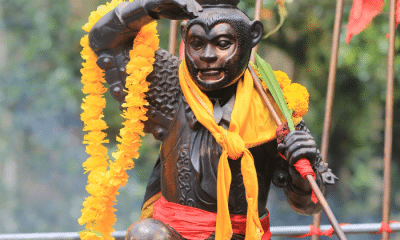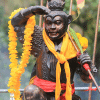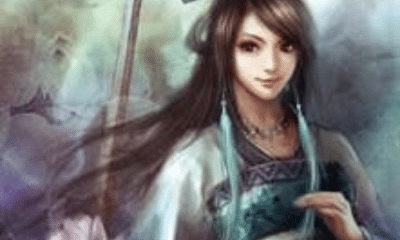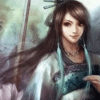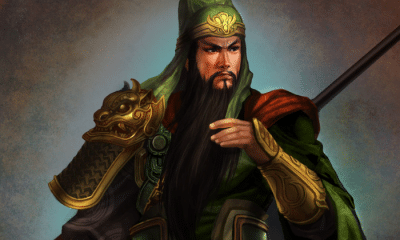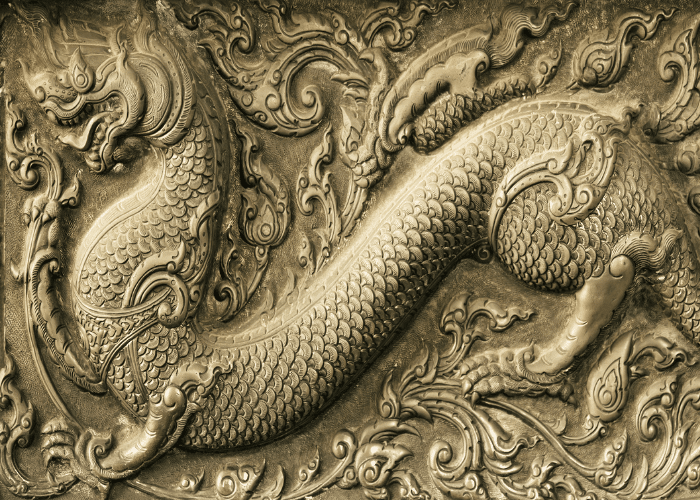
Chinese
The Chinese Dragon King
The Chinese Dragon King
You may know that dragons are important in Chinese art and culture, but how much do you know about their role in religion? Keep reading to find out about the Dragon King and how he controlled and protected all of China!
Long Wang, the Dragon King, is a powerful figure in Chinese folk religion. Adopted by both Taoists and Buddhists, he is the ruler of all water.
As a majestic dragon or a ferocious royal warrior, the Dragon King is known for his temperamental nature and refusal to obey anyone but the Jade Emperor. He uses his ferocity, however, to protect China and its people.
The Dragon King represents far more than just an elemental force, however. Long Wang is the embodiment of the male qualities that make for an ideal ruler.
From a god of rain to a symbol of Imperial power, the image of the dragon is iconic in Chinese culture.
The Legendary Dragon King
The Dragon King, also known as the Dragon God, is a prominent figure in Chinese art and religion. Called Long Wang in China, he has both a human persona and a dragon form.
In East Asian cultures, dragons are most often shown as large, colorful snakelike creatures. While the dragons sometimes have qualities of a turtle or fish, they are most likely seen as enormous serpents.
While some named dragons are associated with specific colors, the dragon king can be shown in any shade. Like other Chinese dragons, he has a “horse-like” head, sharp horns and claws, and a hair-like beard.
As their forms suggest, dragons are also closely associated with water. This is true for the Dragon King, who is a god of water and weather.
Like many weather gods around the world, Long Wang was known for his fierce temper. It was said that he was so ferocious and uncontrollable that only the Jade Emperor could command him.
His human form reflects this ferocity. He is shown as a noble warrior in elaborate bright red robes. He usually has a fierce expression and poses with a sword.
While there are many dragons in Chinese folklore, the Dragon King is the leader of them all.
The Dragon Kings of the Four Seas are often thought of as his brothers. They represent the four cardinal directions, the four seasons, and the four bodies of water along China’s borders.
Ao Guang, the Azure Dragon, is the lord of the east and of spring. He controls the waters of the East China Sea.
The Red Dragon, or Ao Qin, rules over the South China Sea. He is the god of summer.
Their third brother, Ao Shun, is the Black Dragon. Ruling over Lake Baikal in the north, he is the lord of winter.
Finally, the White Dragon is named Ao Run. Representing the west and autumn, he is the god of Qinghai Lake.
All of these dragons, along with the dragons of China’s freshwater lakes and rivers, answer to the Dragon King. Unlike them, he is not bound to any one place.
The Dragon King was said to live in a magnificent palace below the seas. There, he and his brothers feasted on a diet of pearls and precious jewels.
He also controlled all the animals that lived in the sea around him. Like a worldly Emperor, he had the creatures of the water as subjects to serve him and do his will.
The Dragon King was not the only ruler of the water, however. He was often at odds with the more peaceful goddess of the sea, Mazu.
While the Dragon King can be a fearsome and temperamental lord, he is also a protective deity. Just as he controls all of China’s water, he also protects all of its territory and people.
Because of this, he continues to be a popular god, particularly in coastal regions. People pray to him not only in the hopes of avoiding his anger, but also to be protected from their enemies, particularly those that come on ships over the sea.
In these regions, the Dragon King is not only feared for the power of his temper, but is also revered for the help he gives. He is seen as a god who brings good fortune to those who show him respect and obedience.
The Dragon King was such an important figure in Chinese culture that he was adopted into Buddhism as a god as well.
According to the Lotus Sutra, the Dragon King had a daughter named Sagara. She unknowingly came across the Buddha in disguise as a beggar and gave him a valuable gem as an act of charity.
Moved by her generosity, the Buddha personally instructed Sagara. She spread his teachings throughout China, but could not get her father to listen to their wisdom.
After Sagara failed to reach her father many times, the Buddha himself paid the Dragon King a visit. He went down to the dragon’s underwater palace to personally instruct Long Wang.
Although he was reluctant to listen to anyone else, Long Wang eventually recognized the Buddha’s wisdom. He was accepted as a god in Chinese Buddhism and taught all the residents of his underwater realm the lessons of dharma.
My Modern Interpretation
Dragons are a common symbol of water in Asian cultures, but they also have much deeper meanings.
The Dragon King is thought to be an embodiment of yang, the masculine power.
Yang, the counterpart of the feminine yin, is generally thought of as a power of creation. As a weather god, The Dragon King sends rain to fertilize the feminine earth.
This masculinity is also a concept of the traits associated with the male gender. As an embodiment of yang, the Dragon God also symbolizes power, physical strength, and protection.
While different philosophies in China presented different interpretations of yin and yang, the concept of duality was always present. While most creatures and people possessed both elements in some quantity, the Dragon King represented a full expression of yang.
This ultimate expression of one side of the balance is seen in every aspect of the Dragon King’s personality, both positive and negative. His leadership and protectiveness are expressions of yang, but so too are his ferocity and unwillingness to listen to others.
This is also why long, the word for “dragon,” also represents admirable qualities in Chinese culture.
Many Chinese proverbs and idioms use the dragon to represent something of high quality or esteem. One saying, for example, is to hope that a child will become a dragon, or a person with admirable qualities.
The qualities represented by long are those of yang. While Western traditions, and Eastern depictions of the Dragon King’s ferocity, emphasize aggression, Chinese dragons also represent positive virtues of the ideal man.
The dragon does possess physical strength, but uses it to protect his people and punish the wicked. He is intelligent and provides his people with what they need to survive.
Because of the values of yang and long, the dragon became an important symbol of power in ancient China.
Many human kings adopted the title of Dragon King to emphasize their virtues of yang and long. Like the mythological figure, they wanted to be seen as embodying the ideal masculine qualities.
May dynasties adopted the dragon as their emblem and incorporated it into their Imperial art and buildings. Emperors sat on the Dragon Throne and were even sometimes said to be born with a birthmark in the shape of the mythological creature.
The dragon became such an important symbol of authority that it was made an ancestor of human rulers.
A legend arose that the Yellow Emperor, China’s first ruler, became a dragon after his death. This Yellow Dragon was the equal of the Dragon King and resided at the center of all creation.
Because the Yellow Emperor, and by extension the Yellow Dragon, was seen as the ancestor of all Chinese people, they sometimes claimed to be “descendants of the dragon.” The nobility and members of ruling dynasties claimed particularly close descent.
All Chinese dragons were ruled over by the Dragon King. As an expression of masculine generative power, authority, and strength, he was seen as the most pure incarnation of the yang element.
In Summary
In Chinese religion, the Dragon King is the god of all water. Long Wang not only makes rain fall, but he also controls the seas and all the life within them.
He rules over all other dragons, most notably the Dragon Kings of the Four Seas. While these dragons represent specific bodies of water, colors, directions, and seasons, their king encompasses all their powers.
The Dragon King is usually depicted as a fearsome and temperamental deity. He in infamous for refusing to listen to anyone other than the Jade Emperor, even his own daughter when she brought him the Buddha’s teachings.
He uses this ferocity for good, however. He is a protective guardian of both China and its people and is often seen as an auspicious symbol.
The attributes of the Dragon King are extreme examples of yang, the masculine force. While most men have some measure of feminine yin, Long Wang is the embodiment of its opposite.
His abundance of yang gives Long Wang the qualities that exemplify a leader in Chinese culture. He is assertive, intelligent, and physically strong but also uses these powers to protect and provide for the people below him.
These qualities made Long Wang and all other dragons symbols of Imperial power throughout much of Chinese history. All people, particularly within the ruling class, sought to emulate the ideal traits embodied by the Dragon King.


